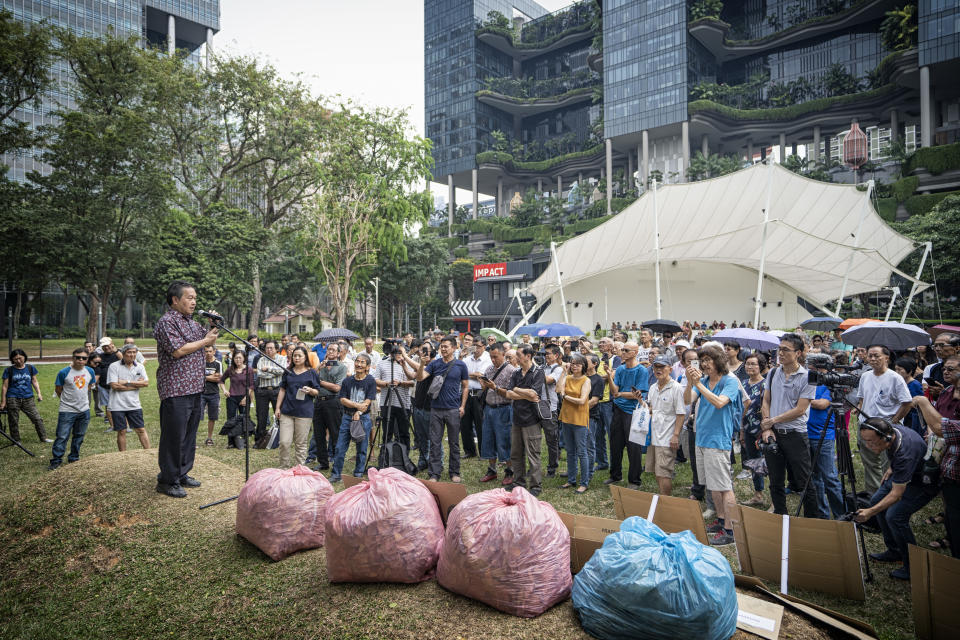Don't blame Singapore investors for Hyflux loss: Andy Mukherjee

By Andy Mukherjee
(Bloomberg Opinion) — If success has many fathers, failure in financial markets is no orphan either: It almost always ends up in the lap of retail investors.
In Hyflux Ltd., there are 34,000 of these moms and pops, set to lose most – if not all – of the S$900 million ($665.5 million) they plonked down in the troubled Singaporean water and power firm’s preference and perpetual shares.
Those securities are in dire straits after Hyflux last week scrapped an accord with SM Investments Pte.(1) The closely held venture of Indonesian tycoons Anthony Salim and Arifin Panigoro had agreed last year to infuse S$530 million to rescue the cash-strapped Singapore firm in exchange for a majority stake. The white knight was at least offering to pay the junior debt holders 10 percent; with SM departing and liquidation looming, the perpetual securities are trading below 5 cents on the dollar.
This is the way capitalism works, the aggrieved investors are being reminded. Their demand that the Singapore government should step in has been a nonstarter, even after some of them even organized a rare protest at the city’s Speaker’s Corner to try to squeeze out a better deal. I supported nationalization last year because of the strategic importance of Hyflux’s Tuaspring desalination plant to the island-city that lacks enough fresh water of its own.
But the moment has passed. Why saddle taxpayers with liabilities when the desalination asset can be theirs anyway, minus an accompanying power-generation unit? (The 411-megawatt plant, which bled in an oversupplied electricity market, has been the key reason behind the firm’s unraveling). Singapore’s water agency PUB has said it will take over the desalination unit at zero cost, and tear up the water purchase agreement with the private firm, if defaults aren’t resolved.
Investors are only human, so they need to blame someone or something — such as the ATM for letting them buy Hyflux’s junior debt with a couple of easy clicks. But there aren’t many voices of sympathy. Stefanie Yuen Thio, a prominent city lawyer cited by the Business Times, says the real problem is that while “Singapore’s securities market has grown in sophistication and complexity, the Singapore retail investor has not kept up.”
Naivete, though, is only a part of the story. The fact that the securities are unrated gets a lonely mention at the end of page 19 in the 2016 offer document. By contrast, the information that the perpetuals can be ordered on an ATM, and via web and mobile, adorns the front page. The low-rate environment, too, made mistakes inevitable. The 2016 Hyflux perps promised a 6 percent coupon, when 30-year Singapore government bonds yielded 2.5 percent. It promised a step-up in 2020 in case the four-year Singapore dollar swap offer rate rose as global interest rates normalized. How many retail investors even know what that benchmark is?
“Due to very low rates and yields in the past five years, Singapore investors, both institutional and retail, have sometimes opted for riskier bonds to increase cash returns,” says S&P Global Ratings analyst Bertrand Jabouley. In an ageing society like Singapore, it’s not uncommon for retail investors to have targets for cash returns.
The Monetary Authority of Singapore told Bloomberg News that it hasn’t uncovered any impropriety by DBS Group Holdings Ltd., the city’s biggest bank that arranged the sale of its securities in May 2016. “All investments carry risks,” the MAS said.
They sure do, and risk factors mention them. “The Group is a new entrant to the power business,” says page 35 of the Hyflux offer document. But is that a fair warning for a S$916 million asset impairment in the first nine months of 2018?
Hyflux was a homegrown success. Temasek Holdings Pte., the state investment firm, had a stake in it in the early 2000s. “Local companies with strong capabilities are building, expanding, gaining a march on their competitors, like Hyflux,” Singapore Prime Minister Lee Hsien Loong said in his national day rally speech in 2009. In 2011, CEO Olivia Lum became the first woman to win the Ernst & Young World Entrepreneur of the Year award. She did business in Algeria, Saudi Arabia, Egypt and Oman.
Nobody is denying those successes. But Hyflux shouldn’t have been allowed anywhere near yield-starved Singapore retail investors in 2016. S&P says that “numbers at that time already suggested that the company’s capital structure was hardly sustainable, with a ratio of net debt to Ebitda above 10x in 2015 and negative Ebitda in 2014, driven by performance issues at the company’s Tuaspring desalination and power plant.”
The loss may be investors’ to nurse, but neither their gullibility nor greed is entirely to blame for it.
(1.) Hyflux says the Indonesians’ repeated refusal to commit to the restructuring agreement led to its termination; SM Investments blames delays in disclosure by Hyflux for holding up allocation of rescue funds between working capital and settlement payments to creditors.
© 2019 Bloomberg L.P

 Yahoo Finance
Yahoo Finance 